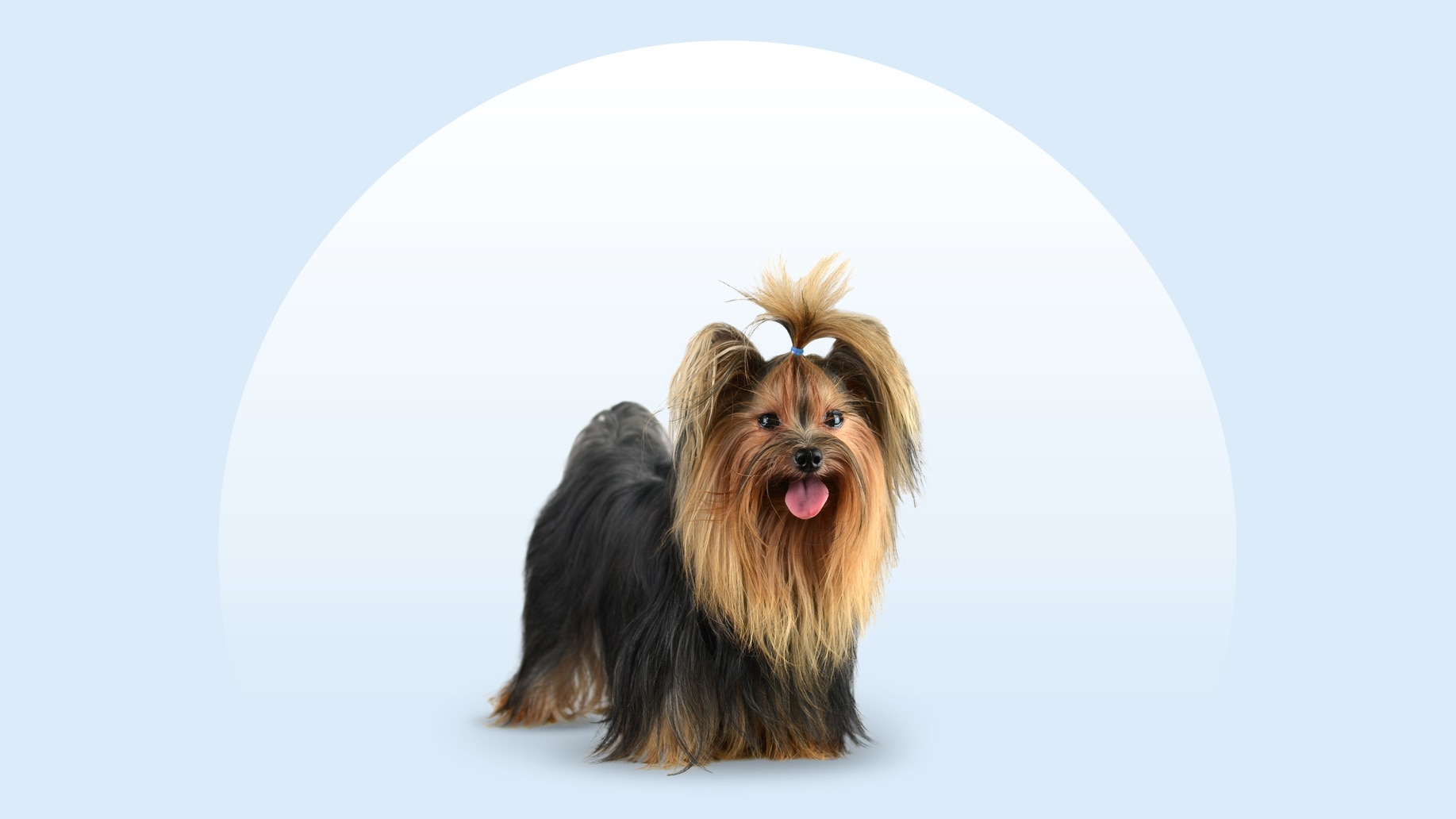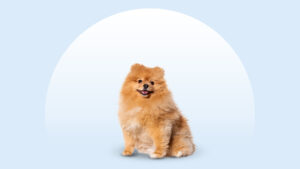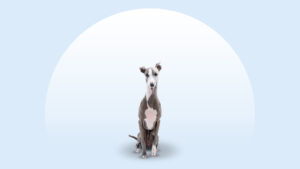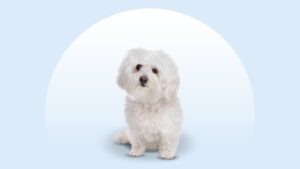Yorkshire Terrier
Updated December 15, 2025
Yorkshire Terrier
Updated December 15, 2025
Sprite and spirited, the tiny Yorkshire Terrier is as fiery as they are loyal. As a clever and outgoing companion, these pups pack a lot of personality in their super small frame.
Clever, Cuddly, Spirited
7 pounds
7–8 inches
11–15 years
Black and Gold, Black and Tan, Blue and Tan, Blue and Gold
Yes, they have great hair that could sell boatloads of shampoo, but the Yorkshire Terrier would probably prefer that you talk about something else. These bright, energetic pups—commonly called Yorkies for short—are more complex than their adorable faces let on.
They love a mentally stimulating puzzle just as much as a spontaneous jaunt around the office to say hello to everyone. (You are bringing these social butterflies to work, right?) Sure, they can be a little feisty and chatty, but Yorkshire Terriers are clever, loyal companions who will love to follow you everywhere you’ll let them.
Yorkshire Terrier Characteristics
Yorkshire Terrier Appearance
With their teddy-bear face, round eyes, soft hair, and tiny body, Yorkshire Terriers might just be in the running for cutest dog ever. Born with mostly black hair, their coat turns more golden and gray (called “blue”) as they age. Some Yorkie parents let these golden locks grow long; others keep them short.
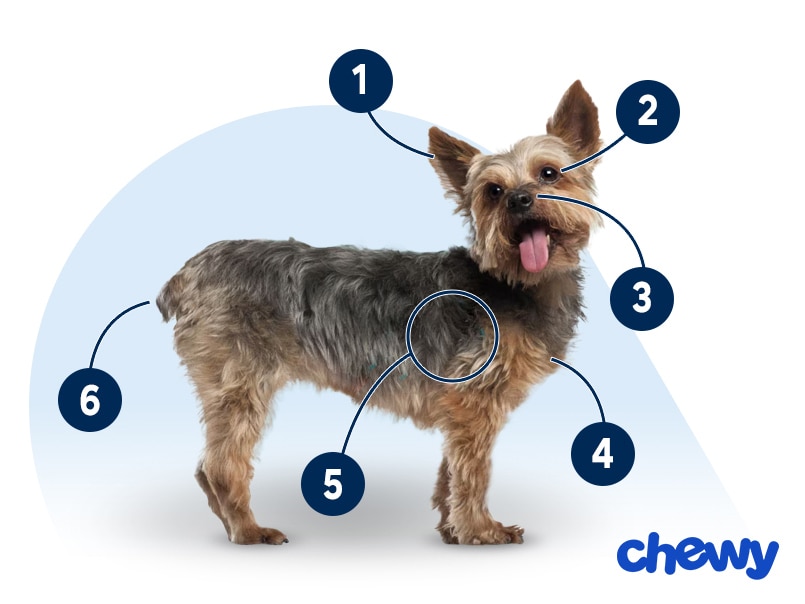
- Ears
The Yorkshire Terrier's perky V-shaped ears sit atop their head like mini flags.
- Eyes
Yorkshire Terrier eyes are dark and sparkle with a curious intelligence.
- Nose
Yorkies have a black button nose.
- Coat Length
A Yorkshire Terrier's hair can grow to floor length. Some pet parents choose to have their pup’s hair trimmed into a shorter haircut.
- Coat Color
Generally, a Yorkie’s silky hair is a mix of black or steel blue with golden or tan markings.
- Tail
While it was once common to dock a Yorkshire Terrier tail, nowadays many of these active pups have their tails left intact. Many groups, including the American Veterinary Medical Association, oppose tail docking, and many countries as well as U.S. states have banned the practice.
Yorkshire Terrier Temperament
Yorkshire Terriers are smart, spunky dogs who don’t know how tiny they are. These confident pups would happily run the house if you’d let them, reminding you when it’s time to get up, serve breakfast, go for a walk, and have quality time.
Fortunately, this clever breed is eager to please, making them a quick study when it comes to training. Yorkie puppies should learn cues early and be socialized from as early as 7 or 8 weeks old (or as young as possible, if you adopt a full-grown Yorkie).
Yorkie pups tend to be loyal, playful, and friendly, and chances are that they’ll be equally independent and affectionate. Meaning, ready to play with other pups and meet people, but eager to chill out with you at the end of the day.
Though they make good family dogs, there is one caveat: The little Yorkie isn’t the best fit for smaller kids because younger children might mistake them for a plushie and try to treat them like a toy. Make sure all playtime between kids and Yorkies is supervised!
How to Care for a Yorkshire Terrier
Yorkshire Terriers may be small, but that doesn’t mean they need any less care than larger dogs. Their hair alone requires lots of upkeep—those silky locks need brushing to keep from getting tangled and matted.
You won’t have to plan too many long workouts, so instead use this time to focus on grooming and training (and, of course, snuggles).
Grooming
Training
Diet
Exercise
Environment
Yorkshire Terrier Health
The Yorkshire Terrier lifespan is 11–15 years, but it’s not unusual for some to live even longer. But, like all dogs, they can develop certain health conditions during their long life.
- Hypoglycemia: Low blood sugar is common in Yorkie puppies. Feed your dog on a regular schedule to prevent hypoglycemia; most pups eventually outgrow it. Keep a high-sugar supplement like Nutri-Cal around in case they need a boost.
- Legg-Calve-Perthes disease: A rare and likely genetic disease that causes bone death and significant joint changes to the femur, Legg-Calve-Perthes usually develops in a pup’s first year, causing pain and limping. Serious cases may require surgery, but most Yorkies make a full recovery.
- Luxating patella: Yorkies can develop a luxating patella, where the kneecap slips out of place. A little bunny hop or skip could be a symptom. It may be treated with joint supplements and meds, if mild, though surgery may be necessary. Keeping your dog at a healthy weight can help keep this condition from worsening.
- Periodontal disease: The Yorkshire Terrier’s short nose, small mouth, and crowded teeth predispose them to dental disease. Plaque, tartar, bacterial growth, and gingivitis can all lead to periodontal disease, causing the death of tissue and teeth.
- Brush your Yorkie’s teeth every day, check their gums regularly for swelling or redness, and note any plaque. If left untreated, periodontal disease can be very painful, cause bad breath and other issues, and progress to a medical emergency.
- Progressive retinal atrophy (PRA): Yorkies are prone to PRA, which is the degeneration of the retina that leads to blindness. While there is no treatment for PRA, dogs often adjust well to vision loss.
- Tracheal collapse: Tracheal collapse happens when the windpipe flattens. It makes it hard to get air into the lungs, and as a result many dogs with it may make a dry, goose-like honking sound. Pups with this condition should have their leash attached to a harness, not a collar (which can push on the trachea). Treatment may include weight management, medications, or surgery.
Yorkshire Terrier History
The Yorkshire Terrier’s origins go back to the mid 1800s in—you guessed it—Yorkshire, England. These dogs are likely descendants of Scottish Terriers, popular with Scottish folks who came looking for work.
Like most terriers, Yorkies were bred to hunt small animals like rats. But by the late 1800s, this working-class little dog had captured the attention of posh Victorian women, who made them proper lapdogs.
Around that time, the pups made their way to the U.S., and the American Kennel Club recognized the Yorkshire Terrier breed in 1885. The Yorkshire Terrier Club of America was founded in 1951. Today, Yorkies remain an exceptionally popular pet.
A Yorkshire Terrier puppy can cost as much as $3,000. If you choose this route, pick a responsible breeder.
You can also consider Yorkie adoption, as there are plenty of these dogs eagerly waiting for their forever homes. Locate Yorkies for adoption via local Yorkie rescue organizations, such as Yorkie Rescue of America; keep an eye out at your local animal shelter; or search Chewy’s database of adoptable dogs in your area.
